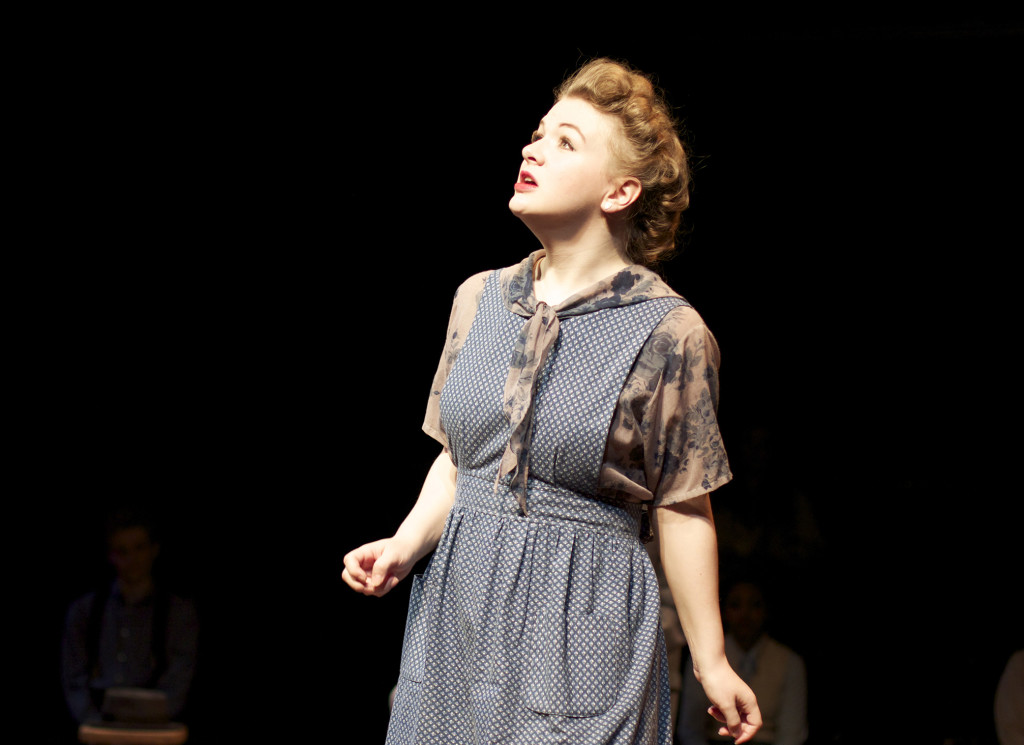Thornton Wilder’s small-town play has hit the big city.
Seattle University’s production of “Our Town,” which opened last Thursday at the Lee Center for the Arts, is just as quaint and simple on campus as in the script—and that’s a compliment.
The three-act play shows everyday moments of different points in time of the small neighborhood of Grover’s Corners, narrated by the Stage Manager (Nathan Palmrose). Act One, which is themed around daily life, introduces the town—the Stage Manager shows us a quaint little town where everyone knows everyone and childhood romances are kindled between neighbors. In the next act, which is called Love and Marriage, we fast-forward three years to the marriage of the sweethearts from the first act. The final act then skips ahead nine years to the tragic death of a main character and the cast, who then play the dead characters in the cemetery, reflects on the precious everyday moments that the living take for granted.

The fall quarter production of Thornton Wilder’s “Our Town” does not disappoint, with the actors’ talent, like that of Bridget Pretz, front and center.
The Lee Center took few liberties with the interpretation of the play or production style in this version of Wilder’s work. “Our Town” is typically performed without a set or extensive props, instead relying on the actors to mime everything from coffee drinking to pulling a cow across the stage. The Lee Center is equipped for the demands of the play and the layout works well. The theater is set up in a round—the seats are arranged around the stage, which is in the middle of the room, and the cast sits in chairs surrounding the stage as well. I found the set up to be quite creative—however, I was frustrated by it every now and then, particularly when I missed the wedding kiss because the minister was blocking my view.
One way the cast works around the absent set is through the use of sound effects, which was at times creative, but at others annoying. I loved the way the cast tapped their fingers to create the illusion of rain, but I wasn’t so thrilled with the sound effects for the crickets and birds on the warm nights in the first act—after a while, the soft whispering and creaking felt like a distracting nervous twitch.
These effects really do set the scene, but the character of the Stage Manager is the cherry on top of the show. Palmrose’s performance is, without a doubt, crucial for the production’s success and on Saturday he was exquisite. He remained committed to the character, never overacted and managed to tell his character’s jokes with subtlety. Other major characters performed well, but they would have had to work against the script in order to outshine Palmrose, whose character was written to shine throughout the entire production.
Although she is not a major character, Virginia McClure as Rebecca Gibbs is absolutely fantastic. Playing an adorable and believable little girl, McClure brings some real personality to her role. Dylan Zucati as her brother George is probably my favorite of the major characters. George is already written to be a very sincere and caring boy, and Zucati remained committed to that portrayal throughout his Saturday night performance.
On stage, George and Rebecca have some endearing scenes together where they play out the big brother/little sister dynamic. Some characters seemed, and were probably written, to be caricatures of small-town America, but Zucati’s George is a very real person in the story—he is a very believable “boy next door.”
His love interest Emily Webb, played by Anya Bychkova, is less sincere on stage. I thought several times that Bychkova failed to convey her young age at the beginning of the play as well as some deep emotional dilemmas at the end of the play.
I give a lot of kudos to the fathers of the play as well. Sam Asher as Dr. Gibbs and Lucas Keihn-Thilman as Mr. Webb play the perfect “sensible American father” incredibly well—each actor’s body language and slow drawls are very deliberate and wonderful.
Although I was expecting more interpretive liberties from a Seattle U play, I think the overarching message of the play was delightful, quaint and concise. Sitting through the everyday and fleeting moments of the slow-paced Grover’s Corners aims to show the audience how precious those small everyday moments are. Getting to the end of the play may have felt long and drawn-out, but that’s the point—the small moments that hold little interest are what matter most.
“Our Town” will be playing at the Lee Center until Sunday, Nov. 24. Tickets are $6 for students, $8 for faculty and staff, and $10 for the general public.
Veronica may be reached at vmazzolini@su-spectator.com








